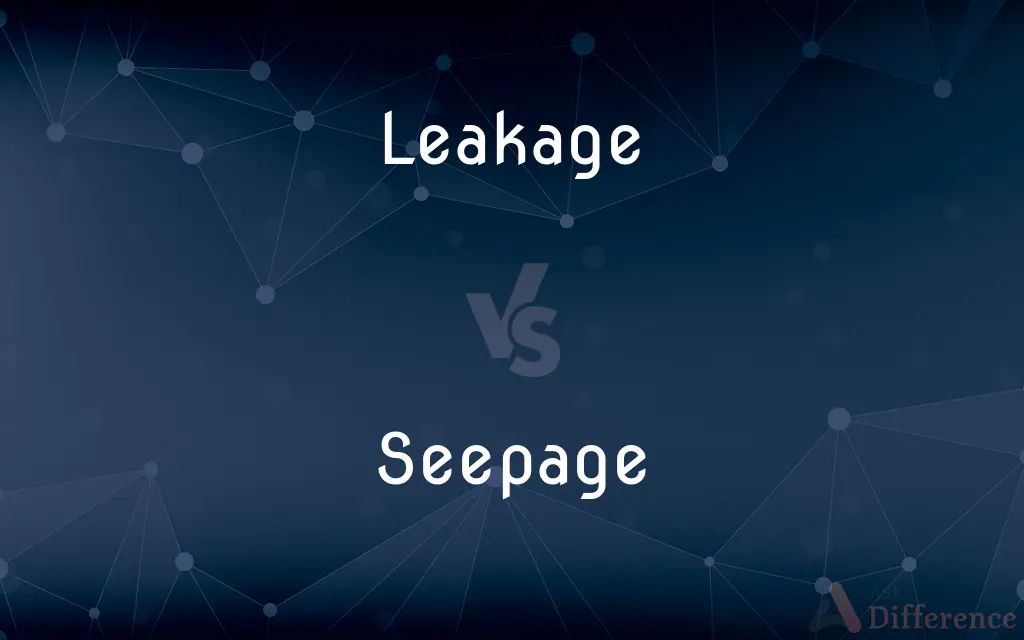Leakage vs. Seepage — What's the Difference?
Edited by Tayyaba Rehman — By Fiza Rafique — Updated on April 15, 2024
Leakage refers to the escape of liquids or gases through a hole or crack, typically implying a system failure, while seepage describes the slow, gradual flow of a liquid through permeable materials like soil or porous rock.

Difference Between Leakage and Seepage
Table of Contents
ADVERTISEMENT
Key Differences
Leakage often indicates a problem in a containment system, such as pipes or tanks, where materials like water or gas escape from intended confinement, whereas seepage is a natural process involving the movement of water through permeable materials without the implication of system failure.
In engineering, leakage is usually considered a defect that requires immediate attention to prevent damage or inefficiency, while seepage is often accounted for in designs, such as in the case of groundwater management or building foundations.
Leakage can occur suddenly and become immediately apparent, posing risks of damage or safety hazards, whereas seepage is typically a slow and gradual process that may go unnoticed for extended periods.
The detection and management of leakage often involve repair and maintenance work to seal breaches in containment systems, on the other hand, managing seepage may involve drainage systems or waterproofing measures to control the flow and impact.
While leakage is generally undesirable and avoided in systems carrying fluids, seepage can sometimes be beneficial, such as in agricultural settings where it contributes to irrigating soil naturally.
ADVERTISEMENT
Comparison Chart
Definition
The escape of liquids or gases through a defect like a hole.
The flow of water or other liquids through permeable materials.
Implication
Indicates a system failure or defect.
Part of a natural or designed process.
Speed of occurrence
Can be rapid and sudden.
Usually slow and gradual.
Typical detection
Often requires immediate repair.
Might not be immediately obvious.
Beneficial or harmful
Generally harmful and undesirable.
Can be beneficial or harmful depending on context.
Compare with Definitions
Leakage
The process of information being released without authorization.
There was a significant data leakage from the corporation last month.
Seepage
Movement of water through a permeable material.
Water seepage in the basement can cause mold.
Leakage
Loss of electrical current in an unintended path.
Electrical leakage can cause a significant increase in utility bills.
Seepage
The process by which liquid slowly permeates or escapes.
Seepage of oil into the ocean bed has detrimental effects on marine life.
Leakage
The accidental loss of fluid from a system.
The engineer noticed a leakage in the pipeline during the inspection.
Seepage
Slow flow of a liquid through small openings.
Seepage from the dam's wall raised concerns about its integrity.
Leakage
Seeping of light through an unintended gap.
There's a noticeable leakage of light around the old window frames.
Seepage
Natural drainage of water through soil.
Soil seepage plays a crucial role in the field's irrigation system.
Leakage
Unintended escape of gas or liquid.
Leakage of hazardous gases can pose serious health risks.
Seepage
Gradual penetration of moisture through concrete.
Seepage through the concrete foundations requires waterproofing solutions.
Leakage
The act or an instance of leaking.
Seepage
The act or process of seeping.
Leakage
Something that escapes by leaking.
Seepage
A quantity of something that has seeped.
Leakage
An amount lost as the result of leaking.
Seepage
The process by which something, especially a liquid, leaks through a porous substance; the process of seeping. Also used figuratively: the process of diffusing.
Leakage
An act of leaking, or something that leaks.
Seepage
Water that has seeped or oozed through a porous soil.
Leakage
The amount lost due to a leak.
Seepage
Water that seeped or oozed through a porous soil.
Leakage
An undesirable flow of electric current through insulation.
Seepage
The act or process of seeping; percolation.
Leakage
Loss of retail stock, especially due to theft.
Seepage
A fluid that seeps out of a container; as, seepage from a reservoir.
Leakage
(sound recording) The situation where sound is picked up by a microphone from a source other than that which is intended.
Seepage
The process of seeping
Leakage
(economics) The loss of revenue generated by tourism to the economies of other countries.
Leakage
A leaking; also, the quantity that enters or issues by leaking.
Leakage
An allowance of a certain rate per cent for the leaking of casks, or waste of liquors by leaking.
Leakage
A leak{3}; also; the quantity of electricity thus wasted.
Leakage
The unwanted discharge of a fluid from some container;
They tried to stop the escape of gas from the damaged pipe
He had to clean up the leak
Common Curiosities
How can leakage be detected?
Leakage can often be detected by visual inspection, using dye tests, or pressure tests in pipelines.
What are the common signs of leakage?
Common signs include wet spots, dripping sounds, or visible holes.
What causes leakage in pipelines?
Leakage in pipelines is typically caused by corrosion, physical damage, or poor construction.
What is the difference between leakage and infiltration?
Leakage is the escape from a contained system, while infiltration involves the entry into a system.
Are there environmental impacts associated with leakage?
Yes, leakage, especially of chemicals or sewage, can have significant environmental impacts.
Can seepage be beneficial?
Yes, seepage can be beneficial, especially in agricultural areas where it helps maintain soil moisture.
What materials are susceptible to leakage?
Materials like old metal pipes, cracked ceramics, and worn seals are susceptible.
Is seepage harmful to building foundations?
Seepage can be harmful as it may lead to structural weaknesses, dampness, and mold growth.
How is seepage controlled in large water bodies like lakes?
Seepage in lakes is controlled through engineering solutions like liners or drainage systems.
How can the impacts of seepage be mitigated in urban areas?
Impacts can be mitigated by improving drainage systems and using waterproofing barriers.
What is the role of soil texture in seepage?
Soil texture affects seepage rates; coarse soils have higher seepage rates than fine soils.
What technologies are used to monitor seepage?
Technologies like moisture sensors and satellite imagery are used to monitor seepage.
Can leakage lead to financial losses?
Yes, leakage can lead to significant financial losses due to damage repair and loss of resources.
How does temperature affect seepage?
Temperature can influence the viscosity of fluids, thus affecting seepage rates.
How often should inspections for leakage be conducted?
Regular inspections depend on the system's vulnerability and previous issues, usually annually or bi-annually.
Share Your Discovery

Previous Comparison
Kimono vs. Hanbok
Next Comparison
Broker vs. UnderwriterAuthor Spotlight
Written by
Fiza RafiqueFiza Rafique is a skilled content writer at AskDifference.com, where she meticulously refines and enhances written pieces. Drawing from her vast editorial expertise, Fiza ensures clarity, accuracy, and precision in every article. Passionate about language, she continually seeks to elevate the quality of content for readers worldwide.
Edited by
Tayyaba RehmanTayyaba Rehman is a distinguished writer, currently serving as a primary contributor to askdifference.com. As a researcher in semantics and etymology, Tayyaba's passion for the complexity of languages and their distinctions has found a perfect home on the platform. Tayyaba delves into the intricacies of language, distinguishing between commonly confused words and phrases, thereby providing clarity for readers worldwide.
















































